Holding the line at Denny Blaine
A temporary reprieve, new leadership, and a conversation with Friends of Denny Blaine’s new co-lead about what comes next
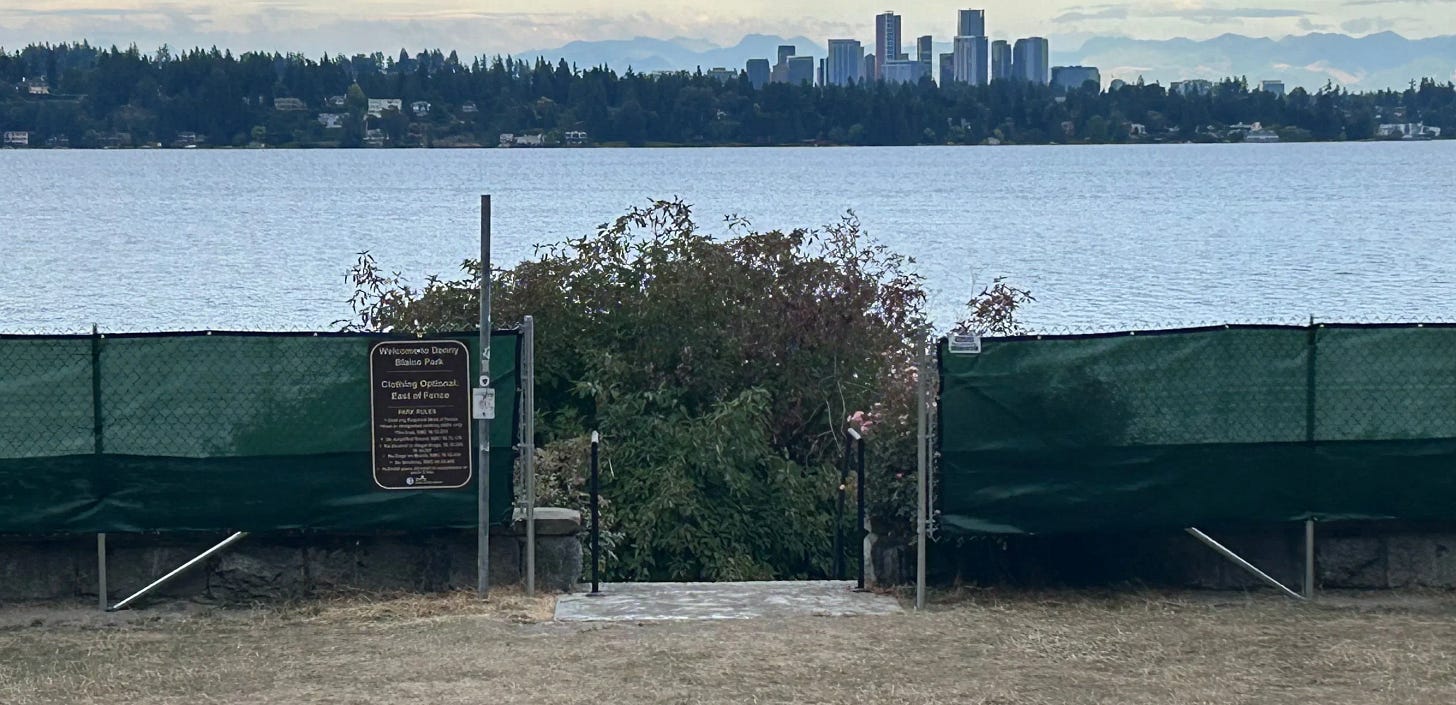
Seattle’s only clothing-optional beach has once again survived a push to shut it down—for now; a brief reprieve in a battle still unfolding. In mid-October, King County Superior Court Judge Samuel Chung ruled that the City of Seattle had made “reasonable efforts in abatement” to address neighbor complaints about alleged lewd behavior at Denny Blaine Park, rejecting a motion that sought its immediate closure while a broader lawsuit continues toward trial next spring.
For now, the park stays open—a fragile outcome that reflects both the city’s cautious compliance and the community’s persistence. After months of legal pressure, new fencing and signage, and the creation of a designated “clothing-optional” zone, Denny Blaine remains public, visible, and deeply contested.
The ruling comes at a time of transition for the Friends of Denny Blaine (FODB), the grassroots stewardship group that has become the park’s most visible defender. In September, the organization announced a new slate of co-leads—Jesse, Nicole, Simon, and Pauly—following two years of leadership under Sophie and Colleen, who helped steer the group through its most turbulent chapter. The new team steps in just as Denny Blaine earned an unprecedented milestone: its addition to the Washington Heritage Register, making it the first nude beach and the first LGBTQ+ heritage site formally recognized by the state.
To understand what this latest moment means for the people on the ground and what comes next, I spoke with Jesse “Swirl,” one of the newly elected co-leads of Friends of Denny Blaine. 🚀
Interview with Jesse, Co-lead of Friends of Denny Blaine
How has it felt stepping into this role with Friends of Denny Blaine?
Stepping into this role feels like a natural continuation of work I’ve been doing for years. My involvement with Seattle’s oldest nude beach began back in 2019, when a wealthy millionaire neighbor donated half a million dollars to build a children’s playground as a way to push us out. I called every news outlet in the area before one finally took the story seriously. From there, it grew into national headlines, even uncovering private texts between Mayor Bruce Harrell and Stuart Sloan about plans to reduce nudity at the park.
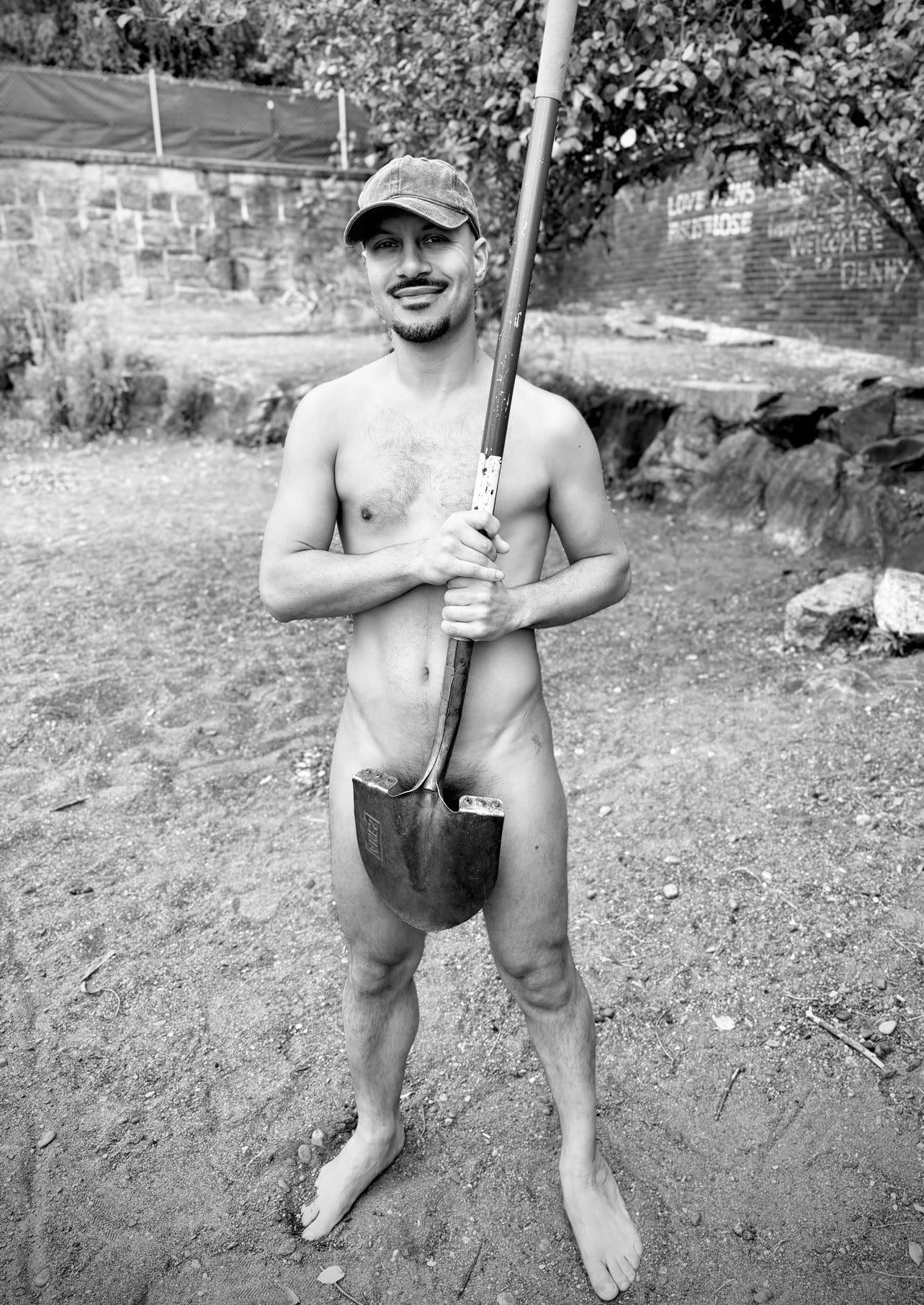
What’s been the biggest change or surprise since the new leadership team came in?
The new leadership reflects a diverse mix of voices. Many of us were on the ground doing the hands-on work, while others bring fresh perspectives and skills we previously lacked to face the challenges ahead. We’ve learned so much from the previous team, who fought tirelessly and gave us the foundation to keep moving forward.
We’re exploring ways to include the arts as part of that future. It’s a passionate team carrying the mission forward of protecting nudity, defending public park access, celebrating free expression, and building a future where body freedom is part of what it means to belong in Seattle.
What does the state heritage recognition mean to you and to the community?
For years, opponents have claimed that LGBTQ+ and clothing-optional use of Denny Blaine is new, but the state’s recognition and decades of historic evidence show otherwise. During the state’s review, officials even emphasized that nudity at the beach predates the current neighbors. Generations of Seattleites have been getting naked here for nearly half a century.
This recognition directly challenges the lawsuit’s claim that nude and LGBTQ+ use only began 10–15 years ago, a narrative already disproven by historical records and firsthand accounts. While it doesn’t provide legal protection, it still affirms our history and visibility.
As the first nude and LGBTQ+ recognized site at the state level, Denny Blaine sets an important precedent and highlights why public access matters. A handful of wealthy homeowners shouldn’t outweigh the thousands of working class people who’ve stood up for inclusion and body freedom. This isn’t just about a park, it’s about who gets to belong in public.
How do you see the group’s relationship with the City right now?
The tone from city officials has changed a lot from two years ago. Nudity isn’t illegal in Seattle, and when the Denny Blaine playground controversy first erupted, community outrage over the City’s proposal to destroy our nude beach pushed officials to move from an antagonistic stance to affirming that nudity isn’t illegal. This was a clear acknowledgment that our presence and practices were legitimate. Over time, we also built a coalition of supportive city officials who recognized that the park’s community and culture are part of Seattle’s public-space identity.
The tone shifted again when wealthy neighbors began using legal pressure and the police as tools of harassment, calling repeatedly to build a paper trail against us. Despite park policy directing rangers, not police, to handle such issues, SPD began responding instead, escalating the situation. Officers ordered people to cover up and even issued a code of conduct violation to a trans woman for refusing, telling her not to return to the park for a week. The police chief later admitted those actions were a “mistake,” even though our leaders were on-site reminding them that non-sexual nudity isn’t illegal.
The lawsuit that followed pulled the issue out of the public’s hands and placed it into those of a single judge. Public access to public land shouldn’t be decided undemocratically by one person, through a process mostly accessible to the wealthy. Since then, the City has grown cautious and deferential, offering muted legal arguments that show compliance rather than conviction. Our relationship now feels complicated. We understand the city’s position, but it’s hard not to feel that the case deserves a stronger, more confident defense of what is already law and what everyday people have built and maintained.
What gives you hope for the park going forward?
What gives me hope for the park going forward is the incredible, diverse community that continues to show up. LGBTQ+ folx, BIPOC community members, longtime naturists, and young newcomers, all united by a shared belief that public space should be free, inclusive, and body-positive.
Being naked is free. People shouldn’t have to pay a fee or travel hours away from the city to a country club just to be who they were born to be. That’s what makes this park so special. It offers connection, freedom, and belonging right here in the heart of Seattle.
There’s also a real cultural shift happening. More people are embracing body freedom, showing curiosity about nudity in nature, and seeing it not as something taboo but as something human. Our community is more organized, connected, and determined than ever. Movements rooted in care, joy, and authenticity always outlast fear and control. 🪐



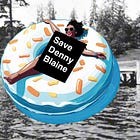
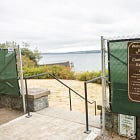


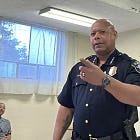
It's interesting to watch the Mayor's race results in Seattle, this week, as the votes continue to be counted, and it's down to less than 2 percent, around 4,000 votes between the incumbent, and his progressive challenger. Still thousands more ballots to be counted, in the city's mail-in, and drop-box ballots.